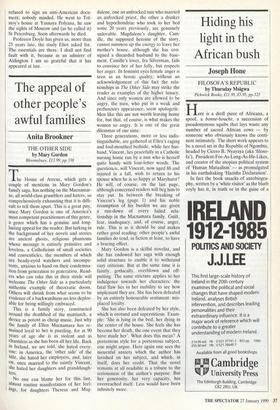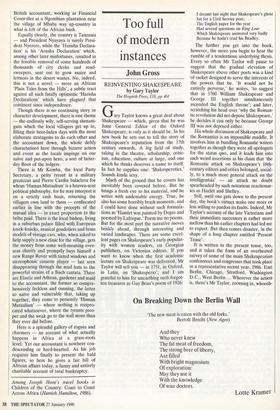Hiding his light in the African bush
Joseph Hone
FILOSOFA'S REPUBLIC by Thursday Msigwa Pickwick Books, £11.95, £5.95, pp.123 Here is a droll piece of Africana, a spoof, a bonne-bouche, a succession of pseudonymous squibs that lays waste any number of sacred African cows — by someone who obviously knows the conti- nent intimately. The short work appears to be a novel set in the Republic of Ngombia, headed by Cicero B. Nyayaya (aka 'filoso- fa'), President-For-As-Long-As-He-Likes, and creator of the utopian political system of 'Human Mutualism'' — as promulgated in his earthshaking 'Harisha Declaration'.
In fact the book smacks of autobiogra- phy, written by a 'white visitor' as the blurb coyly has it, in truth or in the guise of a British accountant, working as Financial Controller at a Ngombian plantation near the village of Mbaba way up-country in what is left of the African bush.
Equally clearly, the country is Tanzania — and President Nyayaya is surely Presi- dent Nyerere, while the 'Harisha Declara- tion' is his `Arusha Declaration' which, among other later misfortunes, resulted in the forcible removal of some hundreds of thousands of city clerks and road- sweepers, sent out to grow maize and lettuces in the desert wastes. No, indeed, this is not a novel — more an African `Plain Tales from the Hills', a subtle tract against all such fatally optimistic 'Harisha Declarations' which have plagued that continent since independence.
Though there is no continuing story or character development, there is one theme — the endlessly wily, self-serving shenani- gans which the local villagers get up to, filling their beer-laden days with the most elaborate stratagems to do each other and the accountant down, the whole deftly characterised here through bizarre action and event as the locals impinge on our naïve and put-upon hero, a sort of latter- day Boot of the ledgers.
There is Mr Komba, the local Party Secretary, a petty tyrant in a military greatcoat and Pierre Cardin balaclava for whom 'Human Mutualism' is a heaven-sent political philosophy, for he may interpret it on a strictly cash basis, returning the villagers own land to them — confiscated earlier in line with the precepts of the mutual idea — in exact proportion to the bribe paid. There is the local bishop, living in a suburban palace filled with European knick-knacks, musical gondoliers and brass models of vintage cars, who, when asked to help supply a new clinic for the village, gets the money from some well-meaning over- seas charity and promptly buys himself a new Range Rover with tinted windows and stereophonic cassette player — last seen disappearing through the mud huts to the powerful strains of a Bach cantata. There are Elastic and Athena, gardener and maid to the accountant, the former so compre- hensively feckless and cunning, the latter so naïve and vulnerable that, taking up together, they come to personify 'Human Mutualism' — where nothing is recipro- cated whatsoever, where the tyrants pros- per and the weak go to the wall more than they ever did before.
Here is a splendid gallery of rogues and charmers — an account of what actually happens in Africa at a grass-roots level. Yet our accountant is nowhere con- descending or hard-hearted. As his job requires him finally to present the bald figures, so here he gives a fair bill of African affairs today, a funny and entirely charitable account of total bankruptcy.
Among Joseph Hone's travel books is Children of the Country: Coast to Coast Across Africa (Hamish Hamilton, 1986).



























































 Previous page
Previous page